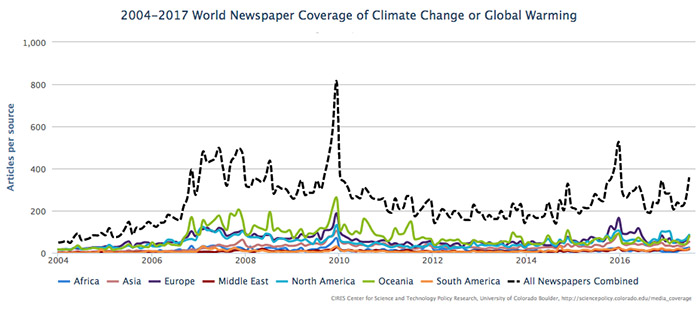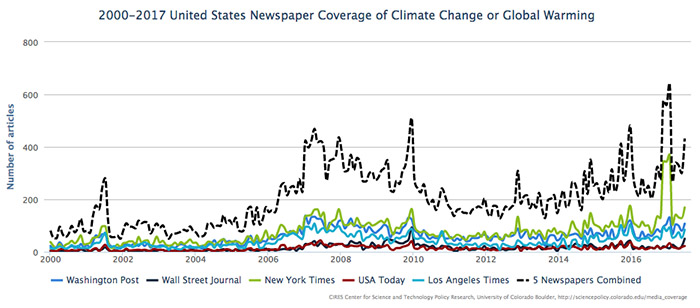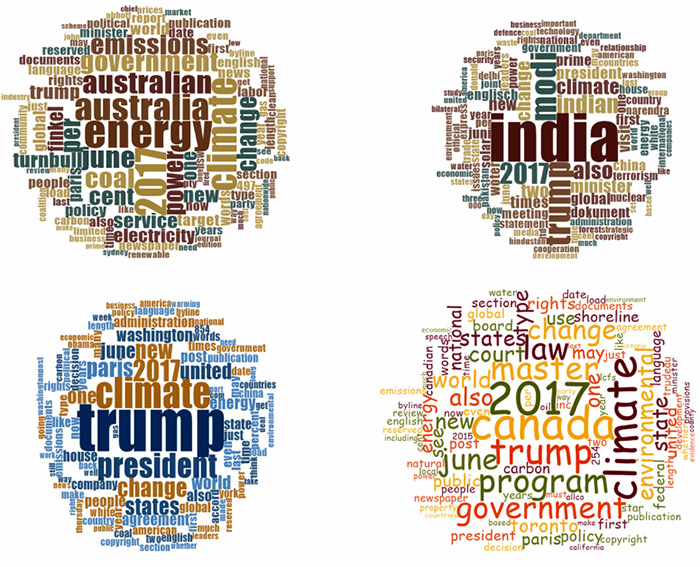MEDIA AND CLIMATE CHANGE OBSERVATORY MONTHLY SUMMARIES |
| The Media and Climate Change Observatory (MeCCO) analyzes traditional/legacy media representations of climate change. MeCCO team endeavors to comprehensively aggregate, monitor, appraise and critically examine media coverage that influence the spectrum of possibility for effective responses to ongoing climate challenges. The MeCCO team monitors coverage monthly in fifty selected sources globally, and eight country profiles (Australia, Canada, India, Japan, New Zealand, Spain, UK, US). |
Issue 6, June 2017 SummaryJune 2017 coverage of climate change and global warming went up nearly 46% compared to May. This was attributed largely to the news surrounding United States President Donald Trump’s withdrawal from the 2015 United Nations Paris Climate Agreement, with media coverage on emergent US isolation following through the Group of Seven (G7) summit a few weeks later. These June 2017 numbers were also a 24% increase from the amount of June 2016 climate change coverage around the world. This was predictably most pronounced at the epicenter of the (in)action, where coverage in June in North America doubled from the previous month’s counts (see Figure 2 for US coverage). Article 28 of the Paris Agreement states that a party to the agreement may withdraw at the earliest after three years from when the agreement entered into force. Since the Paris Agreement entered into force on November 4, 2016, this process can be completed at the earliest on November 4, 2020 (the day after the next scheduled US Presidential election). While coverage around the world has ebbed and flowed in 2017 (see Figure 1), generally coverage in the first six months of 2017 is still 19% down from the first six months of 2016. While ongoing media treatments from the December 2015 UN Paris Agreement fueled early 2016 attention, time will tell how this June 2017 coverage of the US Trump Administration withdrawal will fuel ongoing media representations through the July G20 summit in Hamburg and beyond. |
 Figure 1. Media coverage of climate change or global warming in fifty-two sources across twenty-eight countries in seven different regions around the world from January 2004 through June 2017. |
| So, the most prominent political theme in June 2017 proved to be largely focused on the Trump Administration and the Paris Climate Agreement withdrawal. Moreover, this theme contributed to the uptick in coverage around the world. Examples included reactions from Ireland (in The Irish Times) to Zimbabwe (in The Herald). However, political coverage was not limited just to this beginning-of-June development. In other news, G7 leaders - from Italy, Japan, Canada, United Kingdom, United States, Germany and France - met in Bologna, Italy and issued a communique with a strong statement on climate change policy engagement, covered by The Washington Post among a number of outlets. In addition, in mid-June, many media sources, including The Wall Street Journal, covered the story that a number of prominent oil companies - including Exxon Mobil, Total, Royal Dutch Shell, British Petroleum and General Motors - voiced support for a neoliberal US carbon taxation scheme developed by the 'Climate Leadership Council'. |
 Figure 2. Media coverage of climate change or global warming in five United States sources (The Washington Post, The Wall Street Journal, The New York Times, USA Today, and the Los Angeles Times). |
Coverage of scientific dimensions of climate change in June 2017 included new studies of scientific and economic dimensions of climate change challenges. As examples, sources like The Independent (UK) covered an instantly influential opinion piece in the journal Nature that argued that the global community has three years to take ambitious action in order to bend the greenhouse gas emissions curve steeply enough to meet the Paris Agreement temperature goals. Earlier in the month, media attention was paid to a study published in the journal Geophysical Research Letters which found that wildfires on the Great Plains have increased by over 350 percent over the past thirty years. The Guardian and other outlets also covered a study in the journal Science that examined economic impacts in exacerbation of inequality from the effects of climate change. Coverage of ecological and meteorological dimensions of climate change in June 2017 centered primarily on heatwaves in the Northern Hemisphere. As examples, June 2017 heatwaves in Southern and Western India were also linked in the Hindustan Times to a study that found a 25% increase in heat wave days and duration from 1960 to 2009. And a southwestern United States heatwave around the summer solstice garnered media attention in the Los Angeles Times and in other sources. Cultural dimensions of climate change in June 2017 included many stories of stated commitments from government (such as cities around the world) and non-nation state actors (such as NGOs and industry) to continue to carry out the commitments made in the Paris Agreement despite the US Federal government withdrawal. Figure 3 shows frequency of words in articles across Australia, India, the US and Canada in June 2017. In the United States, 'Trump' was invoked 7176 times through the 432 stories this month. Comparing this with other prominent personalities, (former US President) 'Obama' was mentioned 803 times, (US Environmental Protection Agency Administrator) 'Pruitt' was discussed 493 times and (White House spokesman) 'Spicer' was mentioned 296 times while (German Chancellor) 'Merkel' was discussed 249 times and (French President) 'Macron' was mentioned 230 times. In fact, 'Trump' was discussed more than twice as much as 'Paris' (referring to the 2015 United Nations Climate Agreement) (2387 times), 'science' (566 times) and 'health' (513 times) combined. Comparatively, in Australia, Prime Minister Malcolm Turnbull was mentioned 796 times to 773 mentions of Trump in 497 articles from The Sydney Morning Herald, The Courier Mail & The Sunday Mail, The Australian, The Daily Telegraph & The Sunday Telegraph, and The Age in June. In India, Prime Minister Narendra Modi was invoked 289 times to 296 mentions of Trump in 438 articles from The Indian Express, The Hindu, the Hindustan Times, and The Times of India in June. In Canada, Prime Minister Justin Trudeau was mentioned 258 times to 717 mentions of Trump in 248 articles from The Globe & Mail, The Toronto Star, and the National Post in June. |
 Figure 3. Word clouds showing frequency of words invoked in media coverage of climate change or global warming in Australia (on top left), India (on top right), the United States (on bottom left) and in Canada (on bottom right) in June 2017. Data are from five Australian sources (The Sydney Morning Herald, The Courier Mail & The Sunday Mail, The Australian, The Daily Telegraph & The Sunday Telegraph, and The Age); from four Indian sources (The Indian Express, The Hindu, the Hindustan Times, and The Times of India); from five US sources (The Washington Post, The Wall Street Journal, The New York Times, USA Today, and the Los Angeles Times). |
As June 2017 coverage gives way to intersecting climate science, culture and politics in July, it is worth continuing to pay attention to these ongoing themes and trends. - report prepared by Max Boykoff, Kevin Andrews, Gesa Luedecke, Meaghan Daly and Ami Nacu-Schmidt |

